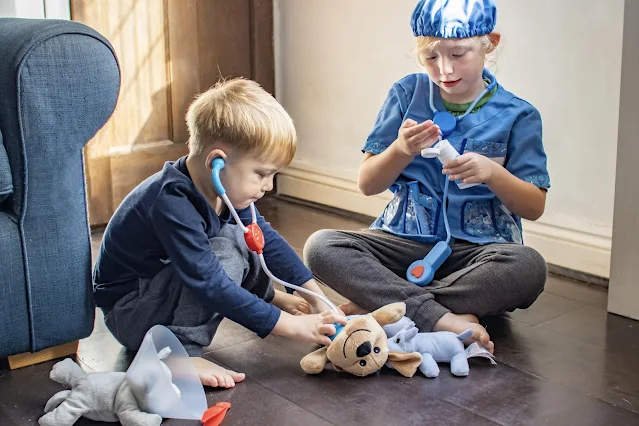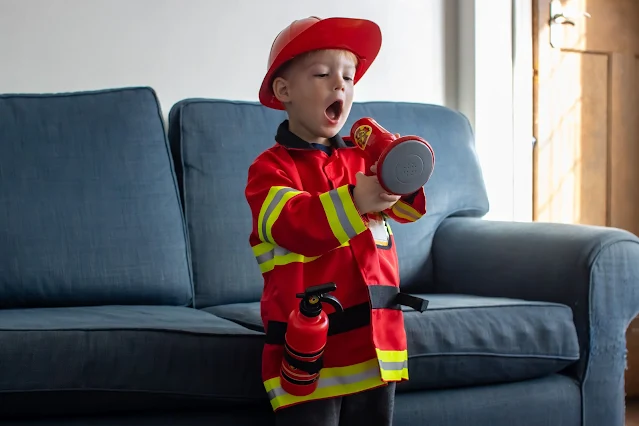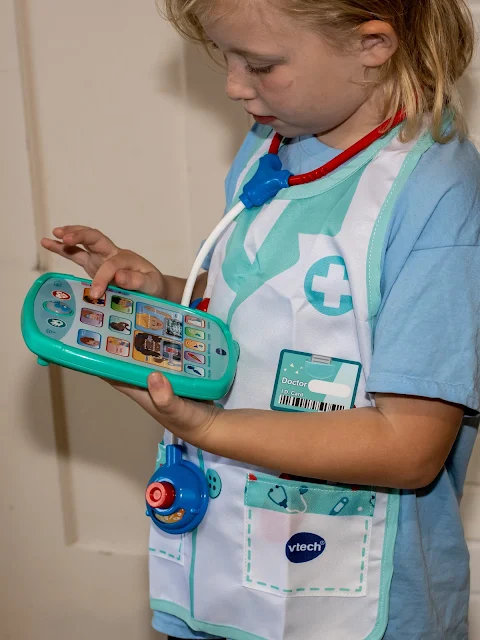AD Imaginative play is an important part of childhood and it has a huge number of benefits. As parents we want our children to spend less time on screens and be able to come up with ideas to entertain themselves, but this isn’t always easy to do. When I ask my children to get off their devices they normally complain and soon after that they say they are bored. So how can you move them from this state to happily playing?
While I like to play structured games with my children or doing crafts and cooking I personally struggle with pretend play and I know I'm not the only Mum to feel this way. If I don't enjoy it myself how can I get my children started with imaginative play? This post identifies the benefits of imaginative play and how to encourage it in your children, even if you aren’t a fan of playing yourself.
What is Imaginative Play?
There are many names for imaginative play including pretend play, creative play, make believe and role play, but in essence they are all the same. It is unstructured play where children create new worlds or adventures. While using toys and props can make it easier or more engaging for children the play doesn’t have to use anything. Imaginative play can be enjoyed by children on their own, with friends or with adults.
Sometimes children will start out with a clearly defined idea of the imaginary world or game they are playing, but often as the play develops it takes new and creative directions.
 |
| Miaow I'm a cat |
The Importance Of Imaginative Play for Children
There is no age limit on the benefits of imaginative play and it can help children from babies through to teenagers. It is particularly important for children because:
- It helps them work through new concepts and explore them in a safe environment.
- It allows them to have control over shaping the direction of play.
- It helps children to practice real world situations so they are better prepared for them in real life. This may include copying what they have seen in the real life or TV.
- It encourages empathy as they can explore different characters and emotions.
- It helps them practise interpersonal relationships.
- It helps them to develop their language skills.
- It encourages problem solving, negotiation and compromise especially when playing with friends or siblings as they will have to agree the rules of their imaginary world or game.
- It helps to inspire their imagination and create stories.
- It helps to develop bonds with friends and caregivers.
10 Ways to Encourage Imaginative Play in Children from Toddlers to Teens
Some children don’t need any prompting to create imaginary worlds and stories, but for others (and many of us as parents playing with them) it can be hard to get started. I’m also not naive, the competition for play with screen time is a big challenge in today's world, but the difference in my children’s behaviour after an hour of screen time versus an hour of play is significant so I use the suggestions myself below to encourage imaginative play with my family.
Start with a story
When imaginative play is unfamiliar or children are used to directed play (where someone else is telling them what to do) a good way to start is by reading a book or watching a short programme. You can then encourage them to recreate the story with cuddly animals and toys they can find around the house and see where it leads.
Set up an invitation to play
An invitation to play is basically just setting up toys or items in a tempting way that encourages the child to go straight in and play with them as soon as they see them. It works best if you set them up overnight ready for when they come down in the morning or when they are at school or nursery so it’s a surprise, rather than trying to set it up with them watching over your shoulder. Role play toys like vets kits can be a great way to do this if you are struggling for ideas.
 |
| Role play toys and fancy dress like the Melissa & Doug Vet Role Play Set and Pet Vet Play Set from Very can encourage imaginative play |
Limit screen time with clear rules
My daughters rarely come off their electronic devices voluntarily. Originally I tried to limit my children to a few hours a day, but I found this caused problems because they would all be on devices at different times and they would keep asking for more time. Then in lockdown I introduced a rule that they couldn’t be on their devices between 9am and 3pm (as well as bath time onwards). On weekends and holidays this gives us a big chunk of time where if we are at home my children have to find activities to entertain themselves. While this is sometimes crafts or cooking, they normally get toys out and create an imaginary world.
Get into costume
Fancy dress costumes like the this Melissa & Doug Fire Chief from Very are a really good way to help children get into character whether it’s as a superhero, a princess or a fireman. There is something about putting on a costume that sparks the imagination.
 |
| Dressing up can encourage children to explore different characters |
Have less toys out
Gentle prompts
 |
| Electronic toys can help inspire imaginative play |
Follow their lead
- who would you like me to be?
- am I doing this right?
- what happens next?
- where should this go?
Don’t worry about them getting bored
 |
| Older children can be more open to imaginative play when playing with younger children |
Ideas to Encourage Imaginative Play in Older Children and Teens
Encourage older children to play with younger children
Make them a director
 |
| These ideas help encourage imaginative play even if you don't enjoy role play yourself |



















No comments
Thanks for your comment (unless it's spam in which case, why?)